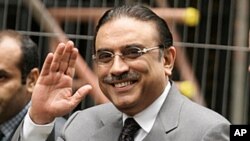The Pakistani government is due to appear before the Supreme Court Monday in a long-running Swiss corruption case involving President Asif Ali Zardari and before a Supreme Court commission in a scandal that has become known as "Memogate."
The commission is investigating the origins of an unsigned memo last May in which Pakistan's civilian government asked Washington for help against a feared military coup in Pakistan. The memo was delivered to the U.S. military shortly after an American raid killed al-Qaida leader Osama bin Laden in his hideout in northern Pakistan.
|
VOA’s Ira Mellman spoke with Ahsan Butt, a Research Fellow at the Kennedy School of Government at Harvard University. He says the wild card in the current situation is the Supreme Court. If they decide to push forward, he says it could result in resignation or early elections. |
The government rejects the memo as a non-issue, but army chief General Ashfaq Parvez Kayani has stated before the Supreme Court that the document is a reality. He dismissed speculation about a possible military takeover as misleading and reiterated “continued support” for the democratic process in Pakistan.
Prime Minister Gilani has criticized General Kayani and Inter-Services Intelligence head Lieutenant General Ahmad Shuja Pasha, for cooperating with a Supreme Court probe into the affair, and has said the standoff is nothing less than a choice between "democracy and dictatorship."
Following Gilani's comments, the army issued a warning of "possible grievous consequences" ahead.
The Supreme Court is expected to decide how to proceed on graft charges against President Zardari and other leading politicians, who claim to have immunity from prosecution in the case.
The court threatened to disqualify the prime minister from office if he didn't initiate corruption proceedings against Mr. Zardari.
The five-judge panel accused Gilani of being dishonest in not obeying a 2009 Supreme Court ruling that struck down an amnesty for some 8,000 senior politicians, bureaucrats and businessmen accused of corruption, murder and terrorism.
President Zardari was among those protected by the 2007 amnesty known as the National Reconciliation Ordinance. He is accused of money-laundering in Switzerland.
The Supreme Court has since ordered all corruption cases to be reopened, including the case against President Zardari. The government has so far stalled on the request, saying Mr. Zardari has immunity from prosecution while in office.











